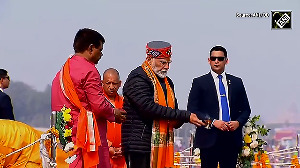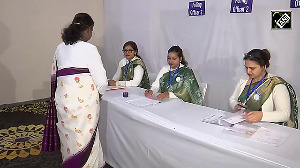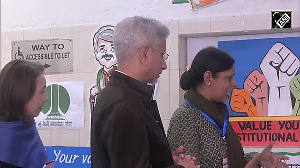Sundram Fasteners is going global with a vengeance. In December it bought the precision forgings business of British company Dana Spicer Europe.
By year-end it will start producing automobile fasteners at its plant in the Haiyan Economic Development Zone, 100 km from Shanghai.
The $5 million plant will have an installed capacity of 6,000 mt and will supply to auto manufacturers in China, Taiwan and Korea. SFL already has a subsidiary TVS Autolec Ltd, which makes oil and water pumps in Malaysia.
This year Hyundai India has drawn up a plan to export 50,000 automobiles from its factory at Irrungattukottai near Chennai. That's scheduled to climb to 75,000 vehicles next year. About 75 per cent of the components in these automobiles which will be shipped to different parts of the globe, will carry the 'Made in India' tag.
Here's an industry that's speeding down the highway and which is likely to reach its destination before schedule. The auto components industry recently announced that it would hit its $1 billion export target by the end of this financial year. What's more, it reckons that exports will touch $5 billion by 2010.
What has got the component makers smiling again? The fact is they went through some tough years as demand slowed in India. But as the Indian market slowed, the components manufacturers turned their attention to foreign markets.
Now they are getting the payoff for those moves. Also, in the domestic market heavy, medium and light commercial vehicle and car sales are booming.
The Automotive Component Manufacturers Association pegged last year's growth at 17 per cent. What's more, it is making extremely optimistic forecasts for the future.
ACMA estimates show cumulative capital investment at the end of 2003-04, in the auto-component industry in India in the region of $2.5 billion, adding around $232 million during this fiscal.
"An additional investment of $2 billion is expected to be made in the component sector in the next six years. This will lead to a domestic market size bulging to Rs 40,000 crore (Rs 400 billion) from the present Rs 20,000 crore (Rs 200 billion)," says ACMA president K V Shetty.
Take a look at how some of the top companies have fared recently. Last year, 19 per cent or Rs 96 crore (Rs 960 million) of SFL's Rs 519 crore (Rs 5.19 billion) topline came from exports.
This fiscal, with its merger with Autolec, an oil and water pump manufacturing unit in Malaysia, exports will account for Rs 170 crore (Rs 1.7 billion) of its Rs 830 crore (Rs 8.3 billion) projected turnover.
Another Chennai-based group, Rane, has indicated that over the next three years, exports in most of the group companies will contribute 18 to 20 per cent to topline.
The group makes steering systems, re-circulating ball, rack & pinion, worm & roller, valve train components for engines, camshafts, automotive & railway brake applications and even seat belt systems. It has 100-odd clients scatterd across 19 countries globally.
Says L Ganesh, vice chairman and managing director of Rane Engine Valves: "The growth has been clearly demand driven, thanks to impressive growth in the gross domestic product and affordable interest rate at the retail end."
After a slump in the second half of the last decade, in 1999-2000 production of auto components was $3.8 billion. Last year, it touched $4.4 billion and if bullish sentiment in the market continues, it is estimated to close the current fiscal with 7 per cent growth at $4.7 billion.
But as exports grew, most of the bigger players became more quality conscious. "The quality bar has risen much after the we started focusing on the export market, thanks to the entry of multinationals," says Rane's Ganesh.
Adds B V R Subbu, president, Hyundai Motor, "Component manufacturers have realised that it is imperative to be sub-system suppliers to automobile manufacturers. Many can make this transformation. For instance, Bharat Forge, which is now a front axle beam supplier, can graduate to a total front axle supplier and could even get into design and work alongside the OEM manufacturers."
When Hyundai entered the Indian market, it had two options. One to make Korean component suppliers to set up shop in India or two, to use good quality suppliers in India itself. It chose the latter.
Today, out of the 65 component suppliers to Hyundai, 52 are Indians. "The industry is in a fast learning curve because of the entry of the multinationals and the hunger to go global or get swamped," says Subbu.
Jack E Thompson, who heads the mobility engineering think-tank, Society of Automotive Engineers International says, "The components sourced from India are good enough for European and American vehicles."
Until recently Thompson was heading the computer-aided engineering and concept development team at DaimlerChrysler Corporation in Michigan, US. Now, DaimlerChrysler plans to buy components from India worth $80 million over the next one year.
In fact, over the last few years Indian auto components manufacturers have established their ability to compete with the best in the world. They've even demonstrated design skills that have matured rapidly.
Says ACMA's Shetty, "In terms of design capabilities, India is second only to Germany and in terms of availability of engineering manpower, India is number one in the world."
Then, over the last one-year, while sprucing up their exports, larger Indian component players also began sniffing at overseas acquistions. Last November, Bharat Forge acquired Carl Dan Penddinghaus GmbH, the largest forging company in Germany.
SFL already has a warehouse in the United States, which it uses for just-in-time supplies to GM. The company is the main supplier of radiator caps to GM in north and south America. Back in the '90s it won GM's best supplier award four years in a row.
Nevertheless, there are challenges galore on the road ahead. One new factor coming into play is the Indo-Thai Free Trade Agreement, which offers about concessional duties for imports of various items from Thailand and vice versa.
ACMA members are worried because Thailand has a strong auto components industry. Starting April 1, eight components can be exported from Thailand at lower duties rates.
Then there is the issue of import duty. Despite the recent sops, it is still 20 per cent. In Thailand it is not more than 5 per cent.
ACMA members say it will be difficult to compete under these circumstances. The Government says it has taken care of the interests of Indian companies.
Then there are the interest costs. Shetty claims that the average borrowing rate is still 12 per cent and only blue chip companies manage to get rates below 8 per cent, making investments an uphill task for small and medium enterprises. This, when the average borrowing rate in Thailand, is around three to four per cent.
But all this is not stopping players from investing and scouring new opportunities. And when the glitches are sorted out, Shetty says there is only one way for the Indian auto component makers -- straight down the highway at top speed.





 © 2025
© 2025